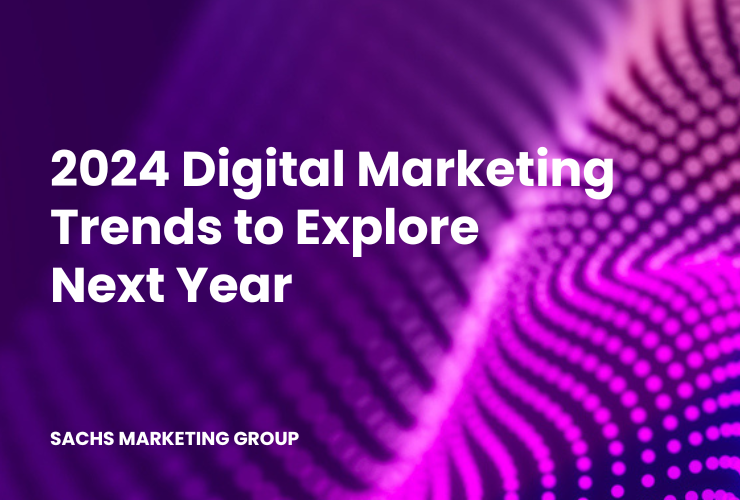There are some exciting 2024 digital marketing trends on the horizon! In the fast-paced world of digital marketing, staying ahead of the curve is a constant challenge. As trends and technologies evolve quickly, businesses must adapt quickly to remain relevant. Embracing change and innovation is key to thriving in this dynamic environment.
In the realm of digital marketing, stagnation is not an option. Keeping your finger on the pulse of the latest trends is crucial for staying competitive and relevant.
Adapting to these changes enhances your digital marketing strategy and ensures your business resonates with the evolving preferences of your audience.
This article explores some of the most exciting 2024 digital marketing trends to explore next year.
Overview
2024 Digital Marketing Trends
As we approach 2024, the digital marketing landscape continues evolving rapidly, presenting challenges and opportunities.
Staying on top of the latest trends is essential for businesses that maintain a modern and successful digital marketing strategy. From leveraging cutting-edge technologies to understanding changing consumer behaviors, these trends offer a roadmap to navigate the complexities of the digital world.
Here are some 2024 digital marketing trends that may help you create a successful strategy next year.
1. The Strategic Use of Artificial Intelligence
Artificial Intelligence (AI) in digital marketing has transcended from being a futuristic concept to a strategic necessity.
In 2024, the strategic use of AI involves more than just automation – it’s about leveraging AI for smarter decision-making and personalized user experiences. AI enables brands to analyze consumer behavior and preferences at an unprecedented scale, allowing for highly targeted marketing campaigns.
Open AI and Google Gemini are just the tip of the iceberg – it’s up to you to implement the power of AI into your digital marketing strategy, whether you’re focused on customer service chatbots, content development, social media influence, or automating PPC campaigns.
AI’s real power lies in its ability to continually learn and adapt, ensuring marketing strategies remain relevant and effective in a dynamic digital environment.
2. Zero-party Data (And the Rise of Quizzes)
Zero-party data is becoming a goldmine for businesses aiming to personalize their strategies and protect the privacy of their website visitors.
Unlike first-party data, collected through user interactions like browsing history, zero-party data is information that customers intentionally and proactively share. While customer surveys have been around for a long time, we’ll likely see a rise in fun, interactive quizzes in 2024.
Quizzes offer a fun and interactive way for visitors to share their preferences with a business. In return, businesses gain valuable insights directly from their audience, enabling them to tailor marketing strategies more effectively.
This direct communication fosters a deeper connection between the brand and its customers, enhancing trust and loyalty.
As privacy concerns increase, zero-party data through quizzes and other forms of direct communication may be something to consider for your digital marketing strategy next year.
3. Content (Based on First-hand Experience) Becomes King Again
As digital marketing evolves to include more AI, there’s a renewed emphasis on content based on first-hand experiences.
This type of content is not just authentic – it’s relatable and engaging, helping brands form deeper connections with their audience. First-hand content can take various forms, such as customer testimonials, behind-the-scenes insights, or thought leadership pieces drawn from direct experience.
Google’s Helpful Content update and Hidden Gems update reveal the search engine’s desire to surface content that delivers first-hand experience from the deepest corners of the web, including forums, social media, and blog posts.
Such content resonates more with audiences because it’s grounded in reality, offering a transparent glimpse into the brand’s world. In 2024, this authentic storytelling will be key in distinguishing brands in a crowded digital space, fostering trust and loyalty more effectively than ever.
Check this out: How to Write Content for A Website [13 Actionable Tips]
4. Google Gets More Social
Search engines face a new challenge as social media platforms like TikTok and Instagram emerge as primary search destinations, especially among younger audiences.
In response to this shift, Google innovates with new features like the Perspectives filter and Notes.
While the Perspectives filter surfaces content from popular social platforms and forums, Notes allows users to add their commentary directly to search results, integrating user-generated content into Google’s index.
This may also act as a direct social signal to Google’s new ranking algorithm, which acknowledges the growing importance of social interactions in determining the relevance and value of content. This integration highlights Google’s strategic adaptation to the evolving digital landscape, where social media’s influence on information discovery and distribution is increasingly paramount.
5. SEO: Google Search Generative Experience (SGE)
Google Search Generative Experience (SGE) represents a significant index evolution.
With SGE, Google displays a large AI-powered super-snippet containing information about your query. It’s still an experiment, but it’s set to end by the end of this month (Dec 2023) and may be rolling out. When this happens, organic results may be buried below the SGE result.
While this may reduce click-through rates, the SGE result often includes the sources of information, so your website may appear more prominently.
This is a huge change, but it does improve the user experience for searches. Instead of digging through multiple sources, SGE can bring information from several sources front and center.
Google is no stranger to being accused of “stealing clicks” from websites and displaying information directly within the index to ensure users stay on Google. Still, only time will tell how or if a website experiences a major drop in click-through rates and traffic.
It doesn’t look like SGE results appear for all queries, so this shouldn’t be viewed as the sky is falling.
6. SEO: Answer Engine Optimization (AEO)
Answer Engine Optimization (AEO) is becoming increasingly important as search engines evolve into answer engines.
AEO focuses on optimizing content to answer specific questions that users will likely ask directly. This involves understanding user intent and providing concise, accurate, and authoritative answers within your content. AEO is particularly crucial for optimizing for voice searches and featured snippets, where direct answers are prioritized.
Brands looking to excel in AEO must create content that addresses specific queries and anticipates potential follow-up questions, providing comprehensive, easy-to-understand answers.
7. SEO: More Focus on Topical Authority
There will be a greater emphasis on establishing topical authority in SEO. This approach involves creating comprehensive, authoritative content on specific topics to establish a brand as an expert.
Search engines favor websites that provide in-depth content across a spectrum of related subtopics instead of sites with isolated, keyword-focused pages. To optimize for topical authority, brands should focus on developing content clusters that cover a topic thoroughly, linking between related pieces to create a cohesive, authoritative resource.
This strategy can help improve search rankings and offer users real value, enhancing their overall experience with the brand’s website.
8. PPC Ads: AI-Powered Automation with Performance Max
Google’s Performance Max (PMax) has transformed PPC campaign management using AI-powered automation.
This tool utilizes AI to optimize ad performance across all of Google’s platforms, including Search, Display, and YouTube. By automating the decision-making process based on real-time data, Performance Max ensures that ads reach the most relevant audience with the most effective messaging.
This increases ad spend efficiency and reduces the workload for marketers, allowing them to focus on strategy and creative development.
Performance Max was a game-changer and offered a more streamlined and effective approach to PPC advertising.
9. PPC Ads: Smart Bidding with Google AI
Smart Bidding in Google Ads harnesses the power of AI to automate bid strategies, making PPC campaigns more effective and efficient.
This feature uses machine learning to analyze many signals in real time, adjusting bids to maximize the potential for conversions. Smart Bidding becomes even more sophisticated, allowing businesses to target specific goals such as maximizing clicks, conversion value, or achieving a target return on ad spend.
This advanced level of automation and precision in bid management enables advertisers to optimize their campaigns more accurately, leading to improved performance and ROI.
10. PPC Ads: Search Intent Over Keyword Match Types
Similar to how Google switched from exact-match keywords for SEO in 2018, PPC advertising is shifting focus from traditional keyword match types to understanding and targeting search intent.
This approach prioritizes the user’s underlying purpose behind a search query over the specific words used. By aligning ad content with search intent, advertisers can create more relevant and engaging campaigns that resonate with the audience’s needs and interests.
This shift improves user experience and drives better campaign performance, as ads are more likely to address the actual requirements of potential customers, leading to higher engagement and conversion rates.
11. Social Media: Followers Will Desire Authenticity in Light of AI
As AI becomes more prevalent in social media, followers’ desire for authenticity grows.
According to the Hootsuite Social Media Consumer 2024 Survey, 62% of consumers are less likely to engage with and trust AI-generated content.
Users will increasingly value and desire genuine human connections. Brands that can balance the use of AI with authentic, transparent communication will stand out.
This trend underscores the importance of personal storytelling, real-user testimonials, and honest brand narratives in building audience trust and loyalty. In an era dominated by technology, the human element remains crucial in fostering genuine connections with followers.
12. Social Media: AI Influencers
AI influencers are reshaping the landscape of social media marketing in 2024. These virtual personalities, created using advanced AI technologies, are gaining popularity for their ability to engage with followers in unique ways.
AI influencers can be programmed to embody specific brand values and aesthetics, offering a new level of consistency and control in influencer marketing. They are not limited by geography or time, enabling around-the-clock engagement.
As a result, brands are increasingly leveraging AI influencers for their campaigns, tapping into their ability to attract and maintain audience attention in a novel and captivating manner.
13. Social Media: The Rise of Social Media SEO
Social Media SEO refers to optimizing content for better visibility and engagement on social media platforms.
It involves using strategic methods like incorporating relevant keywords, effective hashtag usage, and creating engaging, shareable content tailored to the algorithms of different social platforms. This approach enhances a brand’s online presence, increases the reach of its content, and drives more interactions from its target audience on social media.
This approach involves optimizing content for better performance within social networks, using keyword-rich descriptions, effective hashtag usage, and engaging visual content.
Social Media SEO is becoming as crucial as traditional SEO due to the vast number of users discovering content directly through social media feeds.
By employing these tactics, brands can increase their content’s discoverability, drive more interactions, and enhance their presence on platforms where their target audiences spend significant time.
Need Help Staying Ahead of the Curve?
Staying ahead in the ever-evolving digital marketing world can be daunting. That’s where Sachs Marketing Group comes in!
As a full-service digital marketing agency, we craft strategies that align with the latest trends. From leveraging AI-powered PPC campaigns to developing topical authority needed to outrank your competition, our expertise ensures your marketing efforts are modern, practical, and ahead of the curve.
Let us help you navigate these trends and create a digital marketing strategy that separates your brand.
Conclusion
The digital marketing landscape in 2024 is all about adaptation, innovation, and personalization.
Embracing these trends will enhance your strategy and ensure your brand remains relevant and resonant in a rapidly changing digital world. With the right approach and a partner like Sachs Marketing Group, navigating these trends becomes an opportunity for growth and success.
Stay informed, be adaptable, and leverage these trends to take your digital marketing to new heights.
2 Comments
Leave a Reply
Contact us today to get the conversation started!















This blog serves as a comprehensive guide, providing not only an awareness of the trends but also practical tips for implementing these strategies effectively. This blog provides an insightful and comprehensive overview of the anticipated digital marketing trends for 2024.
Thanks for your kind words, Scarlett!